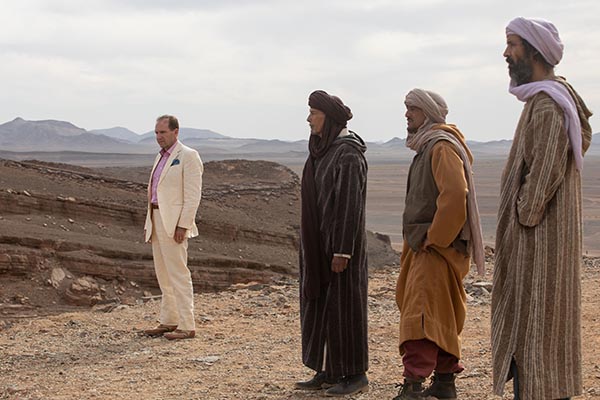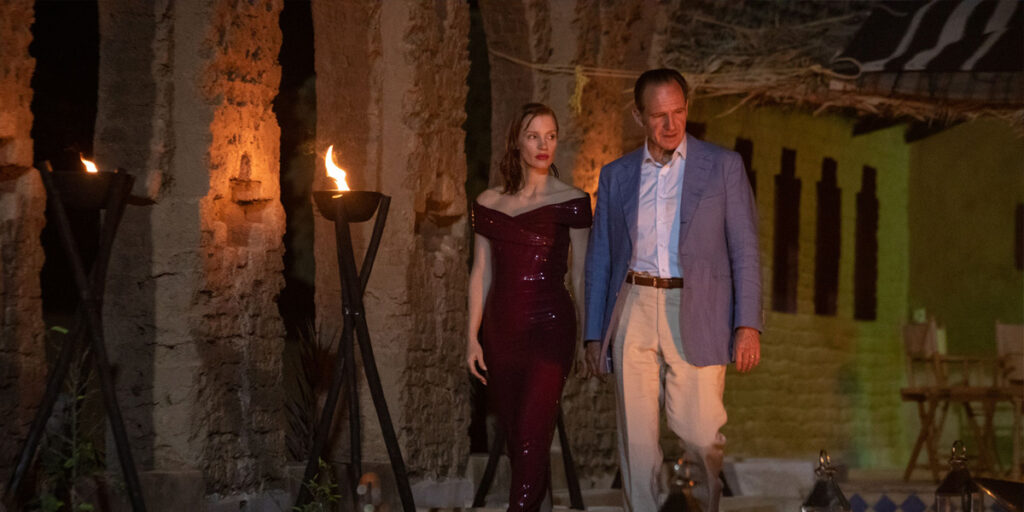The Forgiven thrives with Ralph Fiennes and his character at the center, but it’s uneven when juggling its other characters and the scope of its commentary.
The Forgiven was one of my most anticipated films of Tribeca Film Festival this year, to a point where I even included it on our list of films to watch at Tribeca. Ralph Fiennes and Jessica Chastain, two of my favorite current actors, star as David and Jo respectively, a married couple who take a vacation to Morocco in a last-ditch effort to save their crumbling marriage. But things become instantly disastrous on their way to the luxurious home of their friend Richard (Matt Smith), when a drunk, argumentative David accidentally runs over and kills young Moroccan boy Driss (Omar Ghazaoui). Driss’s father (Ismael Kanater) soon arrives and asks David to return with him to his village to bury Driss. David reluctantly agrees, sending him on a journey of possible self-reflection while Jo stays behind at Richard’s party and, clearly still unsatisfied with her marriage, becomes tempted to have an affair.
Fiennes is far and away the highlight of The Forgiven, not just because of the great performance, but because the best aspects of the filmall revolve around his character. It’s made very clear early on that David is, to put it lightly, not a particularly good person. He looks down on other cultures and peoples, he shows no affection to anyone, and he has no visible remorse whatsoever for having accidentally killed a child. It’s also clear that between himself and Jo, he’s the bigger source of problems and unhappiness in their marriage. While the people he’s surrounded by aren’t nearly as visibly problematic and regularly call him out on his behavior, their milder pomposity does somewhat reflect his own. They don’t seem too much more fazed than him by a Moroccan child’s death, and they’re pretty quick to push David into the uncomfortable positions that result from the Muslims’ responses. Fiennes hits the sweet spot of maintaining his character’s sharp snark and entertaining comedic timing, while keeping him appropriately unlikeable.
As David witnesses the Muslim village react to Driss’s death, Fiennes also nails David’s softly brutal wake-up call as to what he’s truly done. He doesn’t suddenly change into a saint of a human being or anything, but it’s clear that what he’s seeing is affecting him, especially as he interacts more with the family. One of my favorite scenes is when Driss’s father regretfully talks to David about his older hopes for his deceased son. David’s response is his first showcase of genuine emotion, and there’s suddenly a bit of hope that maybe he’s not too far gone. The Forgiven is mainly about people who either can or can’t recognize their own faults in how their statuses and actions affect those lower in the societal hierarchy, taking someone who’s clearly used to ignoring the ripples of his actions and plunging him slowly into those troubled waters.

Jessica Chastain does predicably great with what she’s given, but she’s pretty wasted in a secondary plot that’s nowhere near as interesting as the main story. Most of her screen time in the second and third acts consists of her partying and interacting with various other guests, given only the most simplistic of development as the film continues on. I thought the idea may have been that she’s becoming corrupted by the reckless, snobbish partying while her husband goes through a journey of the exact opposite nature, but this doesn’t really go anywhere by the end. Additionally, Chastain’s material is so basic that I feel like most other actors could have turned in just as good a performance. There’s not really much to chew on, so there’s only so much even the best performers can stand out in this role. She’s even overshadowed by Matt Smith, though that’s not a slight on the usual magnetism that he brings to his own role.
That’s not to say that I’m completely satisfied with David’s story. Specifically, the literal last minute of The Forgiven really left a bad taste in my mouth. I may be alone in thinking this way, but this final scene adds an unnecessary wrinkle to the conclusion of David’s arc that’s far less interesting than it would have been had it ended a minute prior. But worse than that is what I consider a problematic wrinkle in the film’s depiction of Muslims and their behaviors. If The Forgiven is meant to scrutinize and criticize white behavior and perceptions, specifically in relation to underprivileged and minority peoples, a certain character’s final action compromises who we should sympathize with. Whereas earlier David was meant to look like unreasonable for his negative behavior towards going with the Muslims, there’s now a justification for him being apprehensive. Or, if he was always meant to be seen as sympathetic there … then that just muddies what the film is even trying to say to begin with.
This represents the major problem with The Forgiven: it doesn’t seem able to commit to almost any major aspect of its story or tone. It wants to paint higher-class lifestyles as excessive and selfish, but it also portrays Muslim life and people as intimidating with a foreboding score, demonic imagery, and tension-filled pacing. It seems to want to portray the main marriage between David and Jo as deeply problematic with Jo being the one suffering from it, yet Jo spends a majority of the movie with nowhere to go, and what little evolution the marriage has is cut short in the end. It sets up a sense of mystery as to how the car accident really went down, only to reveal a somewhat underwhelming truth in an unceremonious way. The partying is portrayed as shallow, but only David is really put under the microscope as a really problematic, harmful person.
The Forgiven was shot on location in Morocco, and it really knows how to show off the landscape well. You feel the dirt and grime of the desert, especially when it’s contrasted with the more luxurious abodes. The Muslim village feels like a truly authentic, lived-in place, to a point where I honestly can’t tell whether it’s a built set or an actual real-life village. The party house is equally authentic, with lavish production design and flair at nearly every corner. It legitimately makes me want to go to a place like that. The beauty of the desert and the beauty of rich living mix and mingle in eye-pleasing fashion. Lorne Balfe’s name was a pleasant surprise to see in the credits as the film’s composer, and his output is suitably ominous and memorable, to the point of carrying a lot of the dramatic scenes that are light on dialogue, while injecting a more festive flair to the less intense scenes.
The Forgiven has chunks of a great movie at its core. Again, everything surrounding Ralph Fiennes is mostly really good, and the production values clearly had a ton of love put into them. I just wish there was more bite to the commentary, as it’s either too soft or too inconsistent at many turns. Giving Chastain’s character so little substantial material when the character has so much potential also doesn’t sit well with me, nor does an ending that I consider to be a little problematic. The bigger ideas and primary arc are staying with me enough to make me say I’m glad I saw the film, and I can give a mild recommendation to anyone who’s interested. Just know that there are stories that have utilized similar themes better, but there are also ones that have done it a lot worse.
The Forgiven is now available to watch on digital and on demand.

